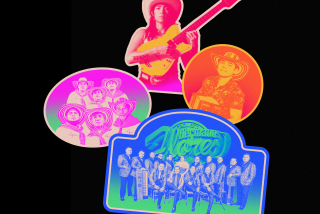Sierra Leone’s Refugee All Stars come to Southern California
When it comes to converting collective trauma into musical inspiration, few corners of the planet can touch New Orleans. For decades, the Crescent City’s litany of natural and man-made catastrophes has prompted lyrics of melancholy resilience to flow from composers’ pens, and sent defiantly uptempo trumpet solos and guitar riffs echoing through the French Quarter.
So when Sierra Leone’s Refugee All Stars decided to end their U.S. tour in New Orleans several months ago, the idea surfaced of having the band stick around town long enough to record its second album. Like Katrina-era New Orleans, the Refugee All Stars, whose members came together in the wake of a bloody West African civil war, have known devastating loss and exile. Like New Orleans in recent years, they also have used music to help heal those wounds.
All those thematic valences unite in “Rise & Shine,” just released on the independent Cumbancha label. The band is showcasing the record on its current tour, and is performing selections from it in three different Southern California venues this week: Tuesday at the Belly Up Tavern in Solana Beach; Wednesday at the Roxy in West Hollywood; and Thursday at Santa Barbara’s Lobero Theatre.
Without sacrificing the passionate urgency that marked its debut, “Living Like a Refugee,” the new album represents a smooth upgrading of the band’s sound. It’s a propulsive combination of reggae/ska beats, Afro-pop hooks, socially conscious hip-hop raps and call-and-response lyrics, augmented by some brassy, witty Big Easy textures courtesy of guest artists including Troy “Trombone Shorty” Andrews and Washboard Chaz.
The new record attempts to tap into the historical and artistic affinities between Sierra Leone and a city whose musical culture dates to its role as a former hub of the African slave trade.
“Besides the obvious, shared, recent dark history, I think just the fact of honoring your musical antecedents is so powerful in New Orleans,” said Steve Berlin, who produced “Rise & Shine” and has collaborated with the likes of Los Lobos, Ozomatli and Angelique Kidjo.
“Rise & Shine” keeps faith with the band’s African folk roots. Two tracks, “Bute Vange” and “Oruwiebe/Magazine Bobo,” are traditional song medleys. Other tracks camouflage biting social and political commentary in bouncy, gotta-dance tempos.
“Like a journalist, I think about what’s happening,” Reuben M. Koroma, the band’s leader and vocalist-percussionist, said in a phone interview. “It’s like giving a voice to the voiceless.”
Koroma said that after touring extensively from 2006 to 2008 to promote “Living Like a Refugee,” the All Stars were eager to get back into the studio. But costly booking fees made that difficult, he said, until the band partnered with Vermont-based Cumbancha.
The group also wanted the new record to demonstrate its songwriting skills. Koroma is credited with six of the album’s 13 tracks, and another band member, Mohamed Kamara, a.k.a. Makengoh, with two more. “It is more fun to play our own music,” Koroma said. “We have a sense that this is ours, and it has a different inspiration. Playing another man’s music is like promoting that man.”
Most of the band’s members first met each other in Guinean refugee camps, where tens of thousands sought shelter from the violence raging in Sierra Leone between 1991 and 2002. The conflict was notable for its viciousness; in addition to the thousands killed, many victims had their hands and feet hacked off with machetes.
Koroma said that among the most persecuted in that era were Rastafarians.
“For most of the people in Africa, especially where you have majority Muslims, Rastas are seen as immoral people,” said Koroma, who in youth aspired to become a reggae musician like his idols Bob Marley, Jimmy Cliff and the Mighty Diamonds. In the days when he wore dreadlocks, Koroma said, even his own relatives shunned him.
Played on homemade instruments, the band’s initial sound was raw and exciting, especially in live performance. The group got a big publicity boost from Oprah Winfrey and from a PBS-aired documentary detailing what Don Heckman described as their “undeniably touching story” in a Times concert review. Among the band’s early supporters were Paul McCartney, Angelina Jolie and Aerosmith, the last of whom jammed with the Refugee All Stars on a cover of “Give Peace a Chance.”
Jacob Edgar, executive producer and founder of Cumbancha, said the band and its studio collaborators knew that “Rise & Shine” had to “rise above the story” of the group’s remarkable personal odyssey to prove that its following “wasn’t just about people feeling sorry for them.”
“At the same time, we didn’t want the record to be slick,” Edgar said. “We wanted to keep some of the spontaneity and charm and retain some of that around-the-campfire spirit.”
That mixture of seriousness and exuberance was a constant presence during recording, Berlin said. He recalled an instance that occurred shortly after the sudden death of one of the album’s U.S. collaborators, the veteran saxophone player Hart McNee.
According to Berlin, the band was rehearsing indoors when the sound of loud drumbeats arose in the street. It turned out to be a traditional New Orleans funeral procession for McNee. As per the local custom, the slow, mournful shuffle broke into a raucous jamboree. The band members naturally joined in and ended up celebrating McNee’s memory with his widow, family and friends.
For the African refugee musicians, it was a timely example of how a unique city’s ambience can transform tragedy into soul-restoring art.
“In New Orleans,” Berlin said, “death’s part of life.”
More to Read
The biggest entertainment stories
Get our big stories about Hollywood, film, television, music, arts, culture and more right in your inbox as soon as they publish.
You may occasionally receive promotional content from the Los Angeles Times.











